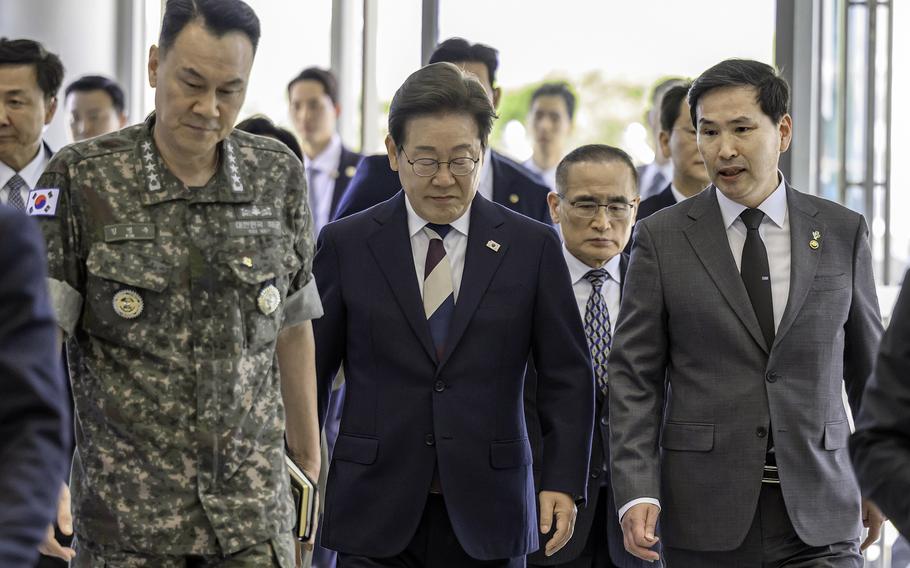
Newly-elected South Korean President Lee Jae-myung, center, visits the Joint Chiefs of Staff combat control room on June 4, 2025, with the Chairman of the Joint Chiefs of Staff Adm. Kim Myung-soo, left, and Acting Minister of National Defense Kim Seon-ho. (South Korean Ministry of National Defense)
Lee Jae-myung, elected South Korea’s newest president on Wednesday, immediately pledged to strengthen the nation’s alliance with the United States while pursuing a pragmatic relationship with China — an approach that has challenged many of his predecessors.
In his inauguration speech Wednesday, Lee committed to reinforcing ties with Washington while building “relationships with other countries from the perspective of national interest and practicality,” echoing the centrist foreign policy themes he emphasized during his campaign.
“We should not fully depend on the alliance,” he said during a televised presidential debate last month. “There is no need for us to intentionally exclude or stand hostile against China or Russia. Diplomacy should always focus on national interest and practicality.”
Foreign policy experts described Lee’s position as an effort to shift South Korea’s diplomatic stance toward a more centrist path, balancing its long-standing security ties with the U.S. and its economic dependence on China.
“South Korea’s strategic balance between the U.S. and China, which Lee Jae-myung’s administration is talking about, is not referring to a 50-50, perfectly equal balance,” Lee Byong-Chul, a researcher with Kyungnam University’s Institute for Far Eastern Studies, said by phone Wednesday. “It is a slight change, bringing something that was excessively biased to the U.S. to the middle. It is realistically impossible to achieve a 50-50 balance with the U.S. and China.”
South Korea has relied on the U.S. for its defense since the 1950-53 Korean War. Roughly 28,500 American troops remain stationed in the country, supported by a $1.1 billion cost-sharing agreement that President Donald Trump frequently criticized as unfair.
While Washington is Seoul’s key military ally, Beijing remains critical to its economy, Hahm Sung Deuk, dean of Kyonggi University’s Graduate School of Political Studies, said by phone Wednesday.
China has historically been South Korea’s largest trading partner. Roughly $273 billion in goods were traded between the two countries last year, according to data from the government-funded Korea Trade-Investment Promotion Agency.
“China is so important to us in our economic growth and economic export,” he said. “The Trump administration must understand our current situation, that we cannot neglect China.”
Tensions between the two regional powers flared in 2017 when South Korea and the U.S. deployed a Terminal High Altitude Area Defense, or THAAD, system in Seongju, about 130 miles south of Seoul, to counter North Korean missile threats.
Despite U.S. assurances that the system was aimed solely at North Korea, Beijing responded with a wide-ranging boycott of South Korean businesses, costing an estimated $7 billion in lost revenue.
Still, Hahm said Lee’s pragmatic stance could help foster a productive relationship with the business-oriented U.S. president.
“In my judgment, Lee will explain this situation very well to Trump and they will make a good deal,” he said. “Trump and Lee are also deal-makers.”